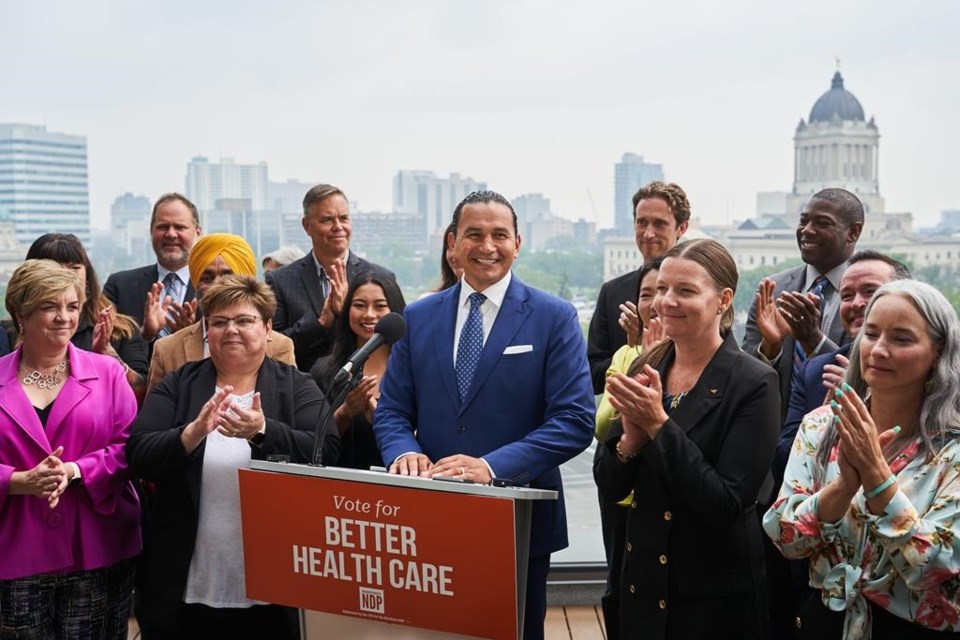WINNIPEG — A First Nations premier would head a province for the first time in Canadian history if the New Democrats win the Oct. 3 Manitoba election, and the significance is not lost on party leader Wab Kinew.
"My dad was not allowed to vote when he was a young man, and I have a shot at potentially leading the province," he said in an interview with The Canadian Press last month.
"That's a big change that speaks to progress in our country and in our province within one generation."
Kinew was born in Ontario and lived on the Onigaming First Nation as a young boy. His late father was a residential school survivor who endured horrific abuse and passed on to Kinew the importance of Anishinaabe culture and language.
The former CBC host was elected in the Winnipeg riding of Fort Rouge in 2016. The following year, he launched a successful bid for NDP leader, putting him on the path to potentially becoming the province's first First Nations premier and second Indigenous premier.
John Norquay was the first Indigenous person to serve as Manitoba's premier. Norquay, who was Métis, was the province's fifth premier until 1887.
And, while other Métis citizens have served at the highest level of politics in the province, Manitoba's history with First Nations leaders in provincial politics only goes back a few decades.
It wasn't until the '50s and '60s that First Nations people were allowed to vote without conditions in provincial and federal elections.
Former New Democrat Elijah Harper was one of the first First Nations people to become a member of Manitoba's legislative assembly in 1981. Since then, there have been more than a dozen Métis and First Nations people who have been elected to serve with the provincial New Democrats, Liberals and Progressive Conservatives.
But there are still disproportionately few Indigenous people entering provincial politics. There has been greater representation in the territories, with a history of Indigenous premiers in the Northwest Territories and Nunavut.
"There are historic barriers that are still being overcome. Some of them are things that have an impact on a personal level, like intergenerational trauma, other things are systemic barriers," said Kinew.
Réal Carrière, an assistant professor in the department of political studies at the University of Manitoba, researches Indigenous representation in Canadian politics.
He said if Kinew becomes premier, it would be a significant moment because it shows an Indigenous person excelling in a space that hasn't always been welcoming for First Nations, Inuit and Métis people.
"There are still dominant stereotypes that view Indigenous Peoples negatively," said Carrière.
"And the real significance here is challenging those stereotypes and then allowing other Indigenous Peoples to see that it's possible to succeed at the highest level."
Kevin Chief knows the power representation can have on youth.
The former NDP member of the legislative assembly and cabinet minister often relays a story from his childhood growing up in Winnipeg's North End, where he boarded a transit bus to find an Indigenous man at the steering wheel.
That moment left a lasting impact on Chief. While he didn't become a bus driver, Chief said that man became a role model for him by opening his mind to possibilities.
"You can't tell young people things are possible, you really have to show them," said Chief.
If Kinew becomes premier, it symbolizes a larger reconciliation movement seen countrywide in Canadian politics and other sectors, said Chief.
"The only way you can become the first First Nations premier of a province is with the support of both Indigenous and non-Indigenous voters."
Indigenous politicians often have to walk in two worlds and balance the expectations within their own community and as an elected official representing a constituency.
Eva Aariak is well versed in this. The current commissioner of Nunavut was the territory's second premier and the first woman to serve in the role in the territory.
The Inuk woman has spent most of her career working in politics either at a local or territorial level.
"Indigenous leaders have an added level of understanding because they have to fully understand both worlds. In many cases, they become more effective that way," Aariak said.
She added that Canada still has a ways to go when it comes to seeing Indigenous people, especially Indigenous women, in leadership roles. But there has been progress, including the appointment of Mary Simon, who is Inuk, as Canada's first Indigenous governor general.
For Kinew, he has said he doesn't just want to be the best First Nations premier, he wants to be the province's best premier. Whether he succeeds in this year's election, he believes Manitoba is moving forward as a province.
"If we have increased participation from all corners of society, I think that strengthens our democracy."
— With files from Steve Lambert
This report by The Canadian Press was first published Sept. 23, 2023.
Brittany Hobson, The Canadian Press


